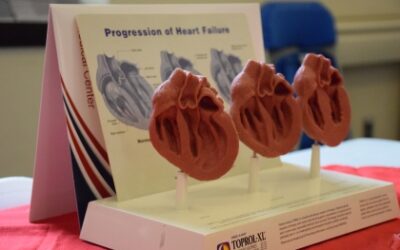Veterans with a higher dietary intake of cholesterol are at increased risk of having a heart attack, according to a recent study that shows a direct link between dietary cholesterol intake and heart attack risk.
CVD, CKD Combine to Increase Surgical Mortality
What are the interactive effects of cardiovascular disease (CVD) and chronic kidney disease (CKD) on long-term mortality following major operations?
Factors Linked to Major CVD Events in Veteran Postmenopausal Women
In contrast to the civilian population, certain indicators of socioeconomic status, such as education, occupation, household income and neighborhood socioeconomic status, aren’t significantly linked to major cardiovascular disease events in postmenopausal women veterans, according to a recent study.
A Quarter of U.S. Veterans Older Than 60 Have Been Diagnosed with CVD
One in 4 U.S. veterans age 60 and older have reported being diagnosed with cardiovascular disease at some point, which has potential implications for their physical and mental health, according to a recent study.
More Benefit From Intensive BP Control in Veterans With CKD Than Original SPRINT Participants
The Systolic Blood Pressure Intervention Trial (SPRINT) found benefits of intensive vs. standard blood pressure (BP) control. But do those findings generalize to adults with chronic kidney disease (CKD)?
VA’s Landmark Study Shifted Paradigm for Managing Diabetes
MEMPHIS, TN — As part of our ongoing series highlighting milestones in federal medicine as part of the 60th anniversary of U.S. Medicine, we spoke with William Cushman, MD, medical director, Department of Preventive Medicine, and professor of Preventive Medicine,...
Higher CVD Events in Older Adults Undergoing Chemotherapy, With Certain Cancers
Cardiovascular disease (CVD) is a greater risk for cancer survivors because of either their malignancy or its treatment.
Cholesterol Medication Ezetimibe Promising for Lowering Alzheimer’s Disease Risk
The mechanism through which heart disease elevates the risk of Alzheimer’s disease and related dementia (ADRD) has been investigated intensively.
Skin Disorders Such as Atopic Dermatitis Can Have Extracutaneous Effects
Aging can lead to the development of cutaneous symptoms and disorders, and in many older adults the effects often are not limited to the skin, according to a new VA study.
More Than 14 million U.S. Adults on Statins Might Not Really Need Them
Equations that estimate 10-year risk of atherosclerotic cardiovascular disease (ASCVD) appear to have overestimated the number of U.S. adults eligible for primary prevention statin therapy, according to a new study.
Is Chlorthalidone Better for Veterans With Past Cardiovascular Events?
Prior myocardial infarction or stroke should be taken into account when deciding to prescribe chlorthalidone (CTD) vs hydrochlorothiazide (HCTZ) in older patients with hypertension.
Longer Deployment, Exposure to Burn Pits Linked to Respiratory, CV Disease
Servicemembers with prolonged deployment to military bases with open burn pits might have an increased risk for developing adverse health conditions, such as respiratory and cardiovascular disease, according to a recent study.
VA Study Implicates High Levels of IL-6 in Long QT Syndrome
Long QT syndrome (LQTS) is a cardiac disorder that predisposes patients to malignant arrhythmias, particularly Torsades de Pointes ventricular tachycardia, which can degenerate to cardiac arrest.
Higher Cardiorespiratory Fitness Linked to Improved CABG Survival in Veterans
Having higher cardiorespiratory fitness scores or being in better physical condition are linked to improved long-term survival in U.S. veterans after coronary artery bypass graft surgery, according to a recent study.
Evaluate Veterans With MGUS for Cardiovascular Disease
Monoclonal gammopathy of undetermined significance (MGUS) is not considered a hematological condition of concern, yet it is associated with lower overall survival. VA researchers led by Lawrence Liu, MD, of the St. Louis VAMC, explored whether the reduced life expectancy arose from an increased risk of cardiovascular events.
Genetic Risk Factors Lead to Potential Therapeutic Targets for Heart Failure
Heart failure affects nearly 6.2 million adults in the United States and disproportionately impacts veterans. The long-term prognosis of heart failure is poor, with a five-year mortality rate of 50%, raising the demand for new therapeutic opportunities.
Statin, Ezetimibe Therapy Combo Shows Promise for Reducing CVD Risk
Combining two different medications used to lower high cholesterol levels, optimized statin therapy and ezetimibe, appears to be associated with reducing cardiovascular risk in U.S. military veterans with coronary artery disease, according to a new study.
Statins Affect Coronary Artery Calcium Score Used to Determine CVD Risk
A retrospective study involving more than 1,000 U.S. veterans has called into question the use of a coronary artery calcium score (CACS) to assess risk of atherosclerosis.
Disparities in Heart Failure Persist Despite MHS’s Universal Care Access
Heart failure affects an estimated 6.2 million adults in the United States and is associated with disability, diminished quality of life and a 5-year mortality of 50%.
Historical Practice of Redlining Is Linked to Adverse Cardiovascular Events
The historical practice of redlining, where neighborhoods were graded based on racial and ethnic compositions, has left a lasting impact on the health of communities across the United States.
VA Study Suggests CVD Risk Might Be Modifiable in CKD/T2D
Is chronic kidney disease (CKD)-associated cardiovascular risk in Type 2 diabetes (T2D) modifiable? The answer is unclear, according to a recent study.
Transporting Pediatric Congenital Heart Disease Patients Not Always Best Course
Is it better to transport MHS pediatric patients with congenital heart disease to a high-volume center for care or treat them where they are, even if it is a rural area?
VA’s CVD Peer Health Coaching Intervention Improved Mental HRQoL
Cardiovascular disease (CVD) is the leading cause of death in the United States, but CVD risk factors remain suboptimally controlled in the VHA and elsewhere.
Demographics of Hypertrophic Cardiomyopathy Patients Appear to Be Changing
The typical hypertrophic cardiomyopathy patient appears to have changed somewhat, according to a new study, which pointed out that “clinicians are encountering a phenotype of hypertrophic cardiomyopathy evolving from the disease recognized several years ago.”
Association Found Between Battlefield TBI, Subsequent Cardiovascular Disease
Traumatic brain injury (TBI) was common among U.S. servicemembers deployed to Iraq and Afghanistan, with up to 20% sustaining at least one TBI. Although the survival rate for such injury was high, research has suggested TBI is associated with a wide variety of adverse effects, including dementia, epilepsy and mental health conditions.
Diabetes Genetic Risk Score Linked to Dementia in Some Veterans
Using the VA’s Million Veteran Program data, a new study has determined that a diabetes genetic risk score is associated with all-cause dementia and clinically diagnosed vascular dementia in veterans.
Rural T2D Patients Improved With Remote VA Care
How did a novel approach to provide diabetes specialty team care to rural veterans with Type 2 diabetes (T2DM) affect clinical outcomes and processes of care?
T2D Drugs Didn’t Differ in Preventing CV Complications
Not many studies have looked at the comparative effectiveness of commonly used glucose-lowering medications, when added to metformin, on preventing microvascular and cardiovascular disease outcomes in Type 2 diabetes.
Causes of Hypertrophic Cardiomyopathy Extend Beyond Genetic Factors
BOSTON — For three decades, hypertrophic cardiomyopathy has basically been considered to be a genetic disease. The cause was believed to be variants in individual genes encoding cardiac sarcomere proteins. But that is changing, however, according to a review published...
Height Might Be a Risk Factor for Several CV Conditions
Height appears to be an unrecognized non-modifiable risk factor for several common conditions in adults, according to a study using data from the VA Million Veteran Program.



